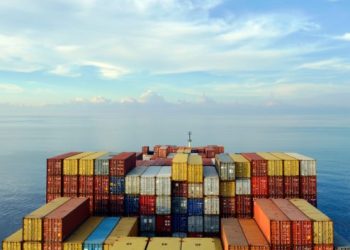During the Global Maritime Forum in Singapore, the Getting to Zero Coalition analyzed its goals, with experts providing their opinion on what the coalition can offer and why it can benefit the shipping industry.
The Getting to Zero Coalition is an alliance of 70 companies within the maritime, energy, infrastructure and finance sectors, supported by key governments and IGOs. The Coalition aims to get commercially viable deep sea zero emission vessels fueled by zero emission fuels into operation by 2030, which is maritime’s ambition target.
Today, international shipping emits 2-3% of global GHG emissions, transporting close to 80% of global trade by volume. To cut the emissions from shipping, the IMO has agreed on an ambition to reduce GHG emissions from shipping by at least 50 percent by 2050. To reach this goal and to make the transition to full decarbonization possible, commercially viable zero emission vessels must start entering the global fleet by 2030, with their numbers to be radically scaled up through the 2030s and 2040s. This will require both developing the vessels as well as the future fuel supply chain, which can only be done through close collaboration and deliberate collective action between the maritime industry, the energy sector, the financial sector, and governments and IGOs.
Specifically, the Getting to Zero Coalition is a partnership between the Global Maritime Forum, the Friends of Ocean action, and the World Economic Forum. It is based on the Call to Action in Support of Decarbonization launched in October 2018 and signed by more than 70 leaders from across the maritime industry, financial institutions and other stakeholders, as well as on the Poseidon Principles – a global framework for climate-aligned ship financing – launched on 18 June 2019.
It gathers decision-makers from across the shipping value chain with key stakeholders from the energy sector as well as from governments and IGOs. The work will be supported by knowledge partners such as UCL Energy Institute, Environmental Defense Fund and the Energy Transitions Commission.
Talking about the coalition during the Global Maritime Forum, Bryony Worthington, Executive Director of Environmental Defense Fund Europe, said that:
We are very happy to be part of this coalition, which is a great set to tackle the challenge of the switch to zero emission economy. The reason why decarbonization in shipping is so dynamic is that, unlike other sectors, you have a convenient body that sets common rules (IMO), and that is a real gift
However, she added that more voices must enter the IMO, to increase diversity, while shipping can learn from other sectors that have addressed decarbonization, that all it takes is ‘some pretty smart policies to unlock billions and billions of investment.’
Why should shipowners care? Because essentially at the moment the biggest problem is the fuel cost. There is an opportunity as we change over to a more diverse fuel model to be part of the new energy system, where we can have many more diverse players
Speaking about a new fuel model, Ms. Worthington highlighted hydrogen, explaining that this fuel can be produced from sunlight water and air. This means, as she explains, that countries with abundance of natural resources can start to lead the energy market.
I think because hydrogen is everyone’s friend, you can make it from everything, you can convert gas into hydrogen, you can use lithium to make hydrogen, you can use renewables to make hydrogen, so it’s a very interesting
In addition, Isabelle Durant, Deputy Secretary-General, UNCTAD, stated that ‘trade set is expected to double by 2050.’ For this reason we have to be responsible and every actor should empower the transition to decarbonization.
Furthermore, Ms. Durant was questioned what the maritime industry can do to prepare for climate change. She answered that the industry must show that it is able to find the solution and that a legal framework is going to be useful in order to achieve its goals regarding environment transition goals.
What is more, providing his viewpoint on the Getting to Zero Coalition, Jan Dieleman, President, Cargill Ocean Transportation, noted that:
If we want to decarbonize the industry, we have to work together. One thing we should really focus on, is engage with people, not only with the ship side but also with the infrastructure
Nevertheless, he added that decarbonization initiatives will have to get financed as well. As he explained, such solutions are economically viable. However, he highlighted that shipping needs a legal framework and a level playing field regarding the reduction of carbon and safety aspects. He mentioned however, that a lot of restrictions will do harm.
Moreover, Soren Toft, COO, Maersk, added to the conversation that it is necessary for the world and for shipping to continue to be a viable mode of transportation. Therefore, he considers the Getting To Zero Coalition as the vehicle to address this, in order to advance and make efforts to innovate, collaborate and scale energy efficient solutions.
Finally, Mr. Toft provided his opinion on what this summit can offer to accelerate the decarbonization of shipping, stating his hopes that this seminar can lead to concrete ideas, and maybe concrete projects around alternative fuels.




























































